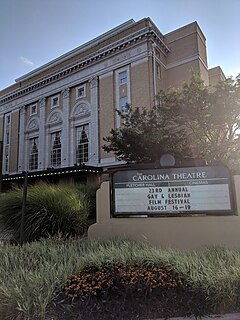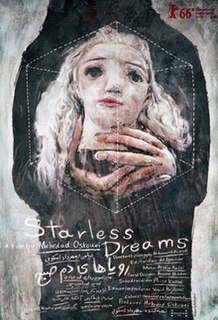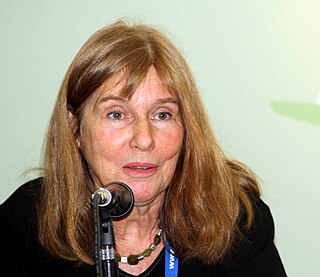Ebele Okoye is a Nigerian-American painter and animator based in Cologne, Germany since 2000.
Karin Beier is a German theatre director.

The North Carolina Gay & Lesbian Festival is an annual LGBT film festival produced by the Carolina Theater in Durham, North Carolina, typically held in mid-August. The festival has been credited in previous years as the second largest LGBT film/video festival in the Southeastern United States.

Sepideh Farsi is an Iranian film director, born in Tehran in 1965.

Ulrich Cordes is a German tenor.
The following is a timeline of the history of the city of Cologne, Germany.

Munich International Film festival is the largest summer film festival in Germany and second only in size and importance to the Berlinale. It has been held annually since 1983 and takes place in late-June/early-July. The next festival will be from July 1 to 10, 2021. It presents feature films and feature-length documentaries. The festival is also proud of the role it plays in discovering talented and innovative young filmmakers. With the exception of retrospectives, tributes and homages, all of the films screened are German premieres and many are European and world premieres. There are a dozen competitions with prizes worth over €250,000 which are donated by the festival's major sponsors and partners.
Astrid Klein is a German contemporary artist. Klein works in a variety of mediums including drawing, painting, text, photography and installation and sculpture.

Sophie Deraspe is a Canadian director, director of photography, and producer. Prominent in new Quebec cinema, she is known for a 2015 documentary The Amina Profile, an exploration of the Amina Abdallah Arraf al Omari hoax of 2011. She had previously written and directed the narrative feature films Missing Victor Pellerin in 2006, Vital Signs in 2009, The Wolves in 2015,
Feministische Organisation von Planerinnen und Architektinnen is an organisation working to address gender issues in the built environment generally and among professionals active in this field.

Over 1,200 women were reportedly sexually assaulted during the 2015–16 public New Year's Eve's celebrations in Germany, in most cases by men of non-European origin. Multiple women reported being raped. In many of the incidents, women in public places had been surrounded and assaulted by groups of men. The Bundeskriminalamt confirmed in July 2016 that 1,200 women had been sexually assaulted on that New Year's night.

Starless Dreams is a 2016 Iranian documentary directed by Mehrdad Oskouei.

Amal Ramsis is an Egyptian filmmaker. She studied directing at the International Film and Television School in Madrid.
The Berlin Feminist Film Week (BFFW) is an international one-week event which shows feminist films from around the world, seeking to increase representation of women, POC and queer filmmakers in the industry.

Florence Hervé is a Franco-German journalist, historian and feminist activist. In the words of one commentator, she "moves in a space between scholarship and journalism". Since 1993 she has also appeared regularly on broadcast media.
The Paris Feminist and Lesbian Film Festival is a women-only film festival founded in Paris, France, in 1989. The festival is organized by Cineffable, an association dedicated to promoting lesbian cinema, and encouraging lesbian creativity.

Anna Hepp is a German filmmaker, artist and photographer.

We Weren't Given Anything for Free is a 2014 medium-length documentary film directed by Eric Esser. The film is a portrayal of former partisan and later trade unionist Annita Malavasi, who, using the code name Laila, counted as one of the few high-ranked women in command in the Italian Resistance Movement during the German occupation of Italy in the Second World War.
Finding Sally, is a 2020 Canadian political autobiographical documentary film directed by Ethiopian-Canadian director Tamara Mariam Dawit and produced by Isabelle Couture. The film received positive reviews from critics.










